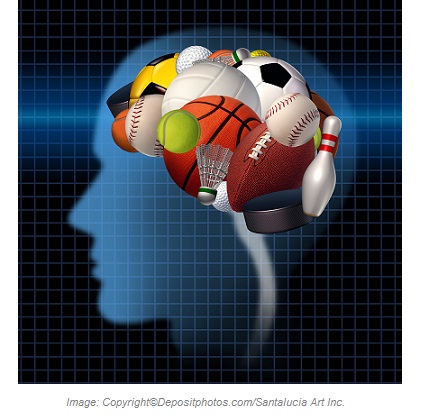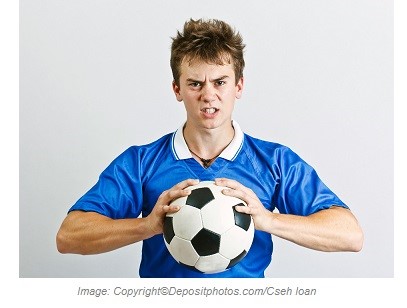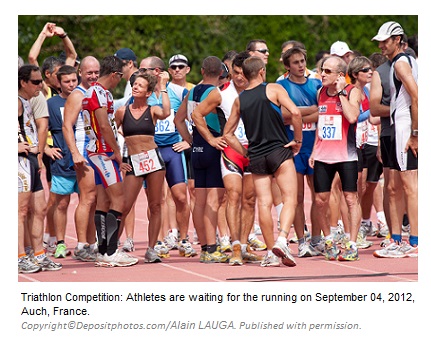Pre – competition anxiety (PCA) is a disorder commonly seen among athletes participating in  any type of competition. It usually starts few days before the competition and gets worse as competition time gets closer.
any type of competition. It usually starts few days before the competition and gets worse as competition time gets closer.
 any type of competition. It usually starts few days before the competition and gets worse as competition time gets closer.
any type of competition. It usually starts few days before the competition and gets worse as competition time gets closer.It is normal for athletes to feel nervous before a competition. However, unsolved pre-competition anxiety may hinder athletes or a team to function optimally. In modern competitive sports, psychological preparation of an athlete or a team is as much important as athletic skills and team working.
Signs and Symptoms of PCA:
- Preoccupation with competition.
- Poor concentration.
- Jitteriness and agitation.
- Sleep disturbances.
- Increased muscle tension.
- Clenched jaws.
- Sweaty palms.
- Increased heart and breathing rates.
- Gastrointestinal disturbances, such as stomach upset, loss of appetite, early satiety, flatulence and feeling full.
Consequences of PCA:
- Decreased athletic performance.
- Athletic discrepancy disorder.
- Increased risk of post – exercise rhabdomyolysis (PER).
- Loss of competitive drive.
- Decreased motivation and self-confidence.
- Triggering IBS (Irritable Bowel Syndrome).
Management and Nutritional Supports for PCA:
It would be a good idea to discuss your nervousness and anxiety with your coaches and a sport psychologist if available. Sport psychologists use different techniques to handle pre – competition anxiety.
Dietary changes and food supplementation help athletes cope easier with pre – competition anxiety.
Restricted Foods:
- Refined sugars.

- Alcohol.
- Coffee.
- Chocolate.
- Candies, cakes and cookies.
- Caffeinated drinks.
- Carbonated beverages.
Recommended Foods:
- Whole grains.
- Legumes.
- Nuts.
- Lean proteins.
- Fruits high in serotonin: dates, bananas, and papayas. Serotonin is the main hormone in the body involved in controlling anxiety.
- Foods high in tryptophan: milk, sesame seeds, sunflower seeds, spirulina, soybeans, and oats. This amino acid converts in the body into serotonin.
- Foods high in inositol: cantaloupe, citrus fruits (except lemons), brewer`s yeast, wheat germs, cabbage, nuts, seeds, and legumes. Inositol involves in nerve transmission and eases nervousness.
- Ginger.
- Chamomile tea.
Recommended Supplements:
- Omega-3: 2 – 3 grams a day. This essential fatty acid has a calming effect.

- Magnesium: 400 – 600 mg a day.
- Calcium: 1000 mg a day.
- 5 – Hydroxytryptophan (5 – HTP): 200 – 300 mg a day. 5 – HTP increases serotonin level and reduces anxiety. CAUTION: 5 – HTP should not be taken in combination with anti-depressant and anti-anxiety medications.
- Melatonin: 6 – 9 mg a day. It improves sleeping quality and promotes relaxation.
- GABA (Gamma-Aminobutyric Acid): 500 – 1500 mg a day. It eases nervous tension and promotes relaxation.
- L – Theanine: 200 – 400 mg a day. This amino acid improves concentration and reduces irritability and anxiety.
- Inositol (Vitamin B8): 500 – 1000 mg a day. Inositol involves in nerve transmission and eases nervousness.
- Saint – John`s wort: 600 – 900 mg a day. This herb contains hypericin that elevates mood and helps with anxiety. Caution: do not take this product along with other anti-anxiety medications.
- Passion flower extract: as a capsule, 450 – 900 mg a day, as a dried herb, 3 – 6 grams, as a tea, 2 – 3 times a day, or as a tincture, 5 – 10 ml a day . It promotes tranquility. This plant contains flavonoids that are responsible for its anti-anxiety activity. Passion flower shows better results if combined with valerian.
- Valerian root: 450 – 900 mg a day. It has a calming effect and shows better results if combined with passion flower.

